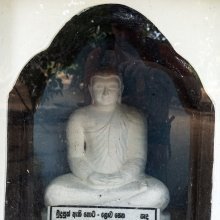Siddhattha, Siddha-attha: 4 definitions
Introduction:
Siddhattha means something in Buddhism, Pali, Jainism, Prakrit. If you want to know the exact meaning, history, etymology or English translation of this term then check out the descriptions on this page. Add your comment or reference to a book if you want to contribute to this summary article.
Images (photo gallery)
In Buddhism
Theravada (major branch of Buddhism)
Source: Pali Kanon: Pali Proper Names1. Siddhattha - The sixteenth of the twenty four Buddhas. He was born in the Viriya pleasance in the city of Vebhara, his father being the khattiya Udena and his mother Suphassa. At the time of his birth all enterprises succeeded, hence his name. He lived as a householder for ten thousand years in three palaces - Koka, Suppala and Kokanuda, (Paduma) - his wife being Sumana (Somanassa) and his son Anupama. He left home in a golden palanquin, practised austerities for ten months, had milk rice given to him by a brahmin maiden, Sunetta of Asadisa, and grass for his seat by a Yavapala, Varuna. His bodhi was a kanikara, and his first sermon was preached at Gaya. The Bodhisatta was an ascetic named Mangala, of Surasena. Samphala and Sumitta were his chief disciples among monks, and Sivala and Sarama among nuns, while Revata was his attendant. Chief among his laypatrons were Suppiya and Samudda and Ramma and Suramma. His body was sixty cubits high. He lived for one hundred thousand years, and died in the Anomarama in the city of Anoma. His thupa was four leagues in height. Bu.xvii.; BuA.185ff.; J.i.49.
2. Siddhattha - The personal name of Gotama Buddha. J.i.56, 58, etc.; iv. 50, 328; vi. 479; DhA.iii.195; Dpv.iii.197; xix.18; Mhv.ii. 24, 25. In the Mtu. he is called Sarvarthasiddha.
3. Siddhattha - An eminent monk in the time of Dutthagamani. Foreseeing dangers lying ahead, he prevented the king from marking out a very large site for the Maha Thupa (Mhv.xxix.52). He was evidently at the head of the monks present at the Foundation Ceremony of the Maha Thupa. See MT. 522, 524.
4. Siddhattha - A son of King Kassapa IV. He was appointed governor of the Malaya district and came to be called Malayaraja. He died young, however, and Kassapa built a hall for the monks in his name and instituted an offering of alms. Cv.lii.68f.
5. Siddhattha - A monk of the Uposatharama, to whom King Kittisirirajasiha gave over the Rajata vihara. The monk had it repaired and had many additions made to it. Cv.c.238ff.
6. Siddhattha - One of the palaces which will be occupied by Metteyya Buddha in his last lay life. Anagat., p. 46.
7. Siddhattha. A monk of Ceylon of the thirteenth century; he was a pupil of Buddhappiya and wrote the Saratthasangaha. P.L.C. 228f.
Theravāda is a major branch of Buddhism having the the Pali canon (tipitaka) as their canonical literature, which includes the vinaya-pitaka (monastic rules), the sutta-pitaka (Buddhist sermons) and the abhidhamma-pitaka (philosophy and psychology).
Languages of India and abroad
Pali-English dictionary
Source: BuddhaSasana: Concise Pali-English Dictionarysiddhattha : (adj.) one who has accomplished his task. (m.), the mustard. (adj.), a semi-divine being; a magician.
Source: Sutta: The Pali Text Society's Pali-English DictionarySiddhattha refers to: one who has completed his task Miln. 214. (Page 709)
Note: siddhattha is a Pali compound consisting of the words siddha and attha.

Pali is the language of the Tipiṭaka, which is the sacred canon of Theravāda Buddhism and contains much of the Buddha’s speech. Closeley related to Sanskrit, both languages are used interchangeably between religions.
Prakrit-English dictionary
Source: DDSA: Paia-sadda-mahannavo; a comprehensive Prakrit Hindi dictionarySiddhattha (सिद्धत्थ) in the Prakrit language is related to the Sanskrit word: Siddhārtha.
Prakrit is an ancient language closely associated with both Pali and Sanskrit. Jain literature is often composed in this language or sub-dialects, such as the Agamas and their commentaries which are written in Ardhamagadhi and Maharashtri Prakrit. The earliest extant texts can be dated to as early as the 4th century BCE although core portions might be older.
See also (Relevant definitions)
Partial matches: Attha, Siddha.
Starts with: Siddhatthaka.
Full-text (+97): Siddhartha, Suppala, Viriya, Vanakorandiya, Pattadayaka, Dhupadayaka, Viravapupphiya, Sattapataliya, Kimsukapujaka, Cangotakiya, Javahamsaka, Dhatupujaka, Machadayaka, Kutidhupaka, Pupphasaniya, Hatthidayaka, Telamakkhiya, Sumanadamadayaka, Sumanatalavantiya, Mekhaladayika.
Relevant text
Search found 27 books and stories containing Siddhattha, Siddha-attha; (plurals include: Siddhatthas, atthas). You can also click to the full overview containing English textual excerpts. Below are direct links for the most relevant articles:
The Gospel of Buddha (by Paul Carus)
The Great Chronicle of Buddhas (by Ven. Mingun Sayadaw)
Buddha Chronicle 16: Siddhattha Buddhavaṃsa < [Chapter 9 - The chronicle of twenty-four Buddhas]
Part 5 - The Week at Ajapāla Banyan Tree < [Chapter 8 - The Buddha’s stay at the Seven Places]
The Story of the Five Bhikkhus (Pañcavaggī Theras) < [Chapter 1 - The Jewel of the Buddha]
The Buddhist Path to Enlightenment (study) (by Dr Kala Acharya)
1. The Buddha and His Teachings < [Chapter 1 - Introduction]
2. Vedic System < [Chapter 4 - Comparative Study of Liberation in Jainism and Buddhism]
Apadana commentary (Atthakatha) (by U Lu Pe Win)
Commentary on Biography of Dhūpadāyaka < [Chapter 3 - Subhūtivagga (section on Subhūti)]
Commentary on Biography of the thera Kapparukkhiya < [Chapter 4 - Kuṇḍadhānavagga (section on Kuṇḍadhāna)]
Commentary on Biography of the thera Uttiya < [Chapter 3 - Subhūtivagga (section on Subhūti)]
Advice To Rāhula (by Nyanaponika Thera)
The Buddha and His Teachings (by Narada Thera)
